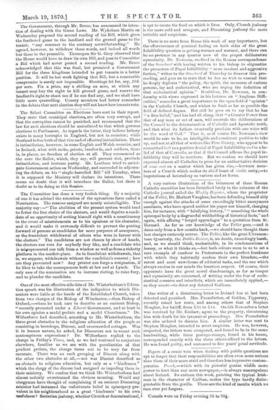There is no news from Rome this week of any
importance, but the effervescence of personal feeling on both sides of the great Infallibility question is getting warmer and warmer, and there can be no pretence in any quarter now of the proper deliberative equanimity. Dr. Newman, credited in the Roman correspondence of the Standard with having written to his bishop to stigmatize the promoters of Papal infallibility " as au insolent and aggressive faction," writes to the Standard of Thursday to disavow this pro- ceeding, and goes on to state that he has no wish to conceal that he deeply deplores "the policy, the spirit, the measures of various persons, lay and ecclesiastical, who are urging the definition of that ecclesiastical opinion." Doubtless, Dr. Newman, in con- formity with views expressed in his lectures on " Anglican Diffi- culties," concedes a great importance to the open field of opinion' in the Catholic Church, and wishes to limit as far as possible the field of defined dogma. But still he goes on to say that he has "a firm belief," and has had all along, that "a Greater Power than that of any man or set of men, will override the deliberations of the Council to the determination of Citholic and Apostolic truth, and that what its fathers eventually proclaim with one voice will be the word of God." That is, as of course Dr. Newman's view would be sure to be, an intelligible and consistent position to take up, and not at all that of writers like Pere Gratry, who appear to be committed both to a positive denial of Papal Infallibility and to a be- lief of that of Councils, so that if the Council affirms the papal in- fallibility they will be nowhere. But we confess we should have expected almost all Catholics to press for an authoritative decision of some sort on a matter which has given rise,—between mem- bers of a Church which makes its chief boast of risible unity,—to imputations of heterodoxy so various and so fierce.








































 Previous page
Previous page